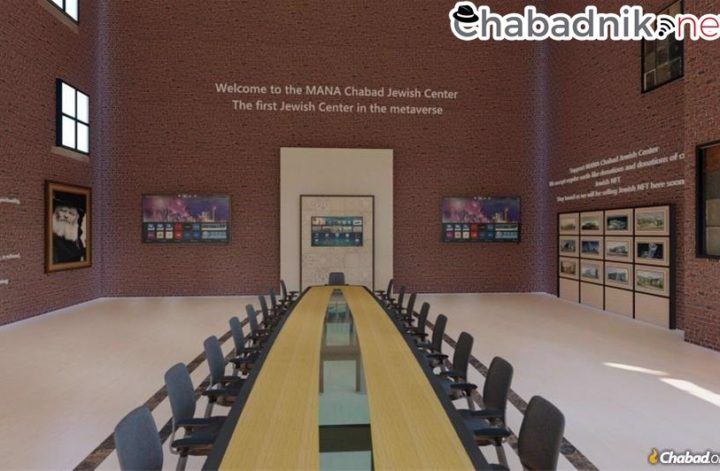Virtual reality becomes the newest place for Jews to congregate
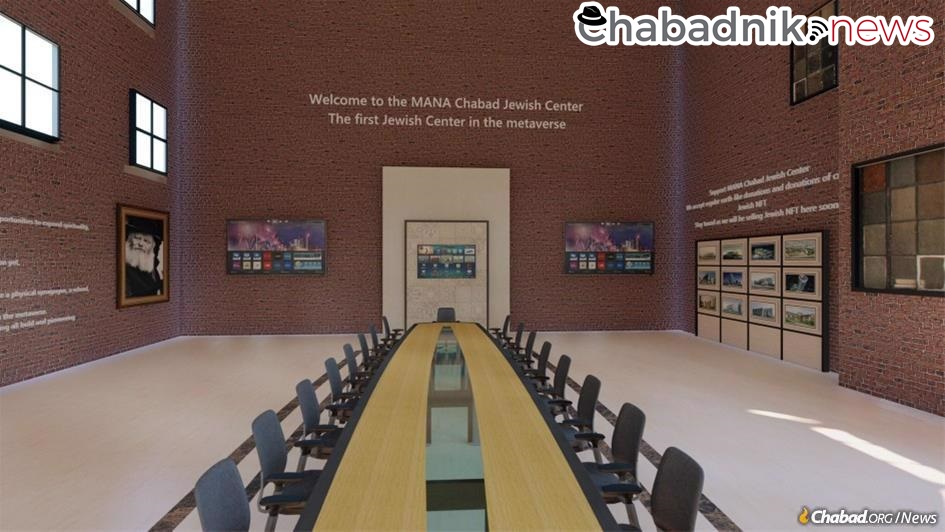
Wherever there are Jewish people, there are Chabad-Lubavitch emissaries working to teach, guide, and uplift them. Even when they are avatars.
Welcome to the Metaverse, a collection of digitally based alternate realities developed to bring different aspects of life into the virtual world. As human beings dive deeper into the technological revolution, ideas about interactive media continue to evolve. The Metaverse is the next step: a virtual world where we exist as avatars of ourselves, working, learning, traveling, and socializing, alone or with others, just as we do in the real world. Only in the Metaverse, we barely have to lift a finger. This new reality promises efficiency and ease, and the opportunity to experience things the physical world often makes all but impossible with the limitations of time and distance.
While many Metaverses are currently being developed, like Facebook’s recently-announced ‘Meta,’ a virtual space called Decentraland is one of the more fully developed to date. With a focus on social interaction, Decentraland is home to businesses and organizations looking to share their services with users—whether through social events, educational classes, or experiential activities.
For Rabbi Shmuli Nachlas, and his partners, Rabbi Yisroel Wilhelm and tech-expert Alex Gelbert, it is the next place to connect with their fellow Jews.
“If people are there, then we should be too,” says Nachlas, who is co-director with his wife, Chani, of the Jewish Youth Network in Ontario, Canada. He and Wilhelm, co-director with his wife, Leah, of the Rohr Chabad Center at the University of Colorado in Boulder, are committed to creating a fully operating virtual Chabad House like any other. The goal is “to meet and inspire Jews, wherever they are” and they intend on building a presence on any metaverse that needs their support.
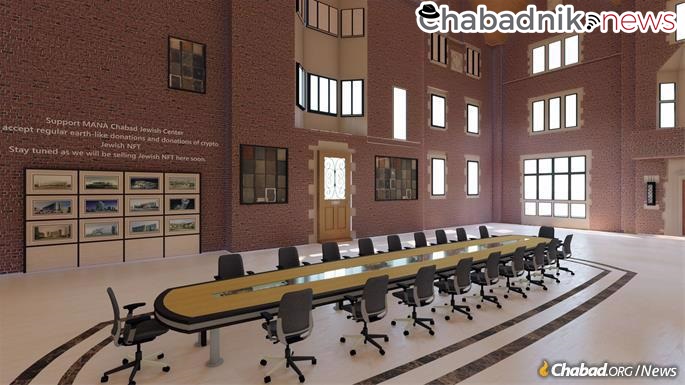
Buying Virtual Real Estate
How does it work?
About a year ago, the partners had the idea to create a Jewish space in the Metaverse, and officially bought a plot of land a few months ago (using cryptocurrency, which is used across the Metaverse). They began building what they called the “MANA Chabad Jewish Center,” named for the Ethereum token that powers the Decentraland virtual reality platform, where Jews spending time in Decentraland can come to receive support and guidance, and learn about Judaism. Its plans include creating a place of Torah study, community events, connecting with other Jews and shopping for Judaica. And while reality itself may be on a whole different plane in the Metaverse, Nachlas ensures that Torah will always remain the same.
“The principles of Judaism are unshakable, and mitzvot are physical actions, meant for our physical world,” the rabbi explains. “We plan on being a space of inspiration and support, and to help connect people back to reality when needed, both spiritually and physically.”
“In Chassidus, we learn that mitzvot help us to create a dirah b’tachtonim, a dwelling place for G‑d in our physical world,” Nachlas continues. As such, this virtual Chabad Center has the same goal. There will be a focus on spiritual inspiration in the Metaverse with the pointed objective of bringing users back “down to earth” for Shabbat dinners, tefillin, shaking the lulav and etrog, and all other mitzvot that can only be done in the flesh. Of course, the center will not provide services on Shabbat or Jewish holidays.
Nachlas believes that as technology continues to develop and expand, a Jewish presence must follow, reaching people everywhere, even when that may be outside of our physical realm. He explains that, in some ways, Chabad inspiration may even be more crucial in the Metaverse.
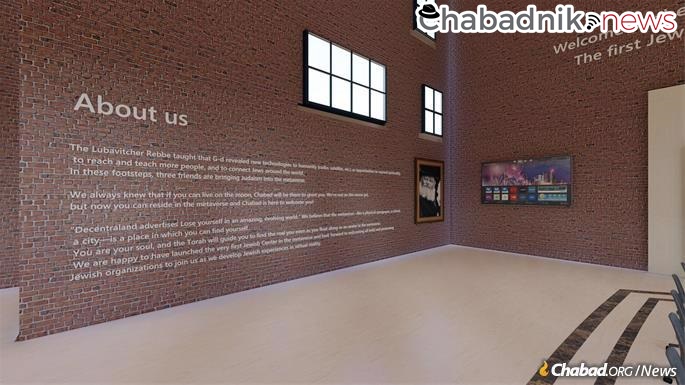
The dangers of this new reality that our world is stepping into are real and cannot be ignored, the rabbis acknowledge. While the Metaverse takes the word expansion to a whole new level, it may very well take people away from this universe, and in turn, shrink their physical reality, the one that truly counts. Decentraland boasts of developing a world in which people will “lose themselves.” And it is for those exact people that the MANA Jewish Center was created, says Nachlas, to be a light to help them find themselves again, one that can guide them and ground them back to this world.
As Nachlas puts it, “We can either turn our backs on it in fear and disbelief, or we can learn how to work with this new reality to ensure the spread of as much Torah as we can”, a concept already quite familiar to the Chabad-Lubavitch community.
“The ultimate purpose for which these new technologies were developed,” the Rebbe, Rabbi Menachem M. Schneerson, of righteous memory, taught, “is that they be used for holy purposes… The fact that they can also be used for mundane purposes, and even things that are the opposite of holiness, is to facilitate free choice… and G‑d commands, requests and grants the capacity that ‘you shall choose life.’
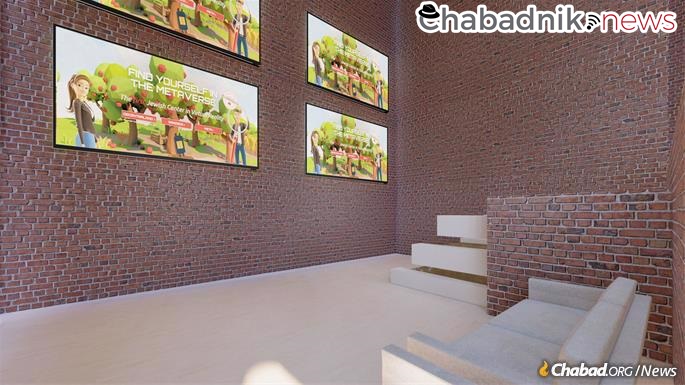
Thus decades ago, when radio and TV first began their successful spread into mainstream culture, Chabad rabbis galvanized by the Rebbe pioneered spreading Torah and Judaism over the airwaves. When satellite appeared, the Rebbe’s farbrengen gatherings were broadcast throughout the United States, with projects such as Chanukah Live bringing the eternal wisdom of the Torah to an international audience. Through websites like Chabad.org, which attracts more than 60 million visitors a year from around the globe, the Rebbe’s vision of harnessing the power of the Internet for the good—or, put another way, revealing the very purpose of its creation by G‑d—is bringing the depth and wisdom of Judaism to Jews and non-Jews on all four corners of the world.
Today, the MANA Chabad Jewish Center is the first of its kind, as not only the first Jewish presence in the Metaverse, but as one of the first centers of religion and spiritual guidance there of any kind. They hope to set a precedent, and help to create a space in the virtual world where Torah, spirituality, and Jewish community are both easily accessible and meaningful.
Although the project is still a work in progress, the plans have been approved and building is already underway, but with an exciting twist: The MANA Chabad Jewish Center is designed to replicate Chabad World Headquarters at 770 Eastern Parkway, bringing its special familiarity and energy to the Metaverse.
The rabbis hope that in a virtual world where everything may be new and unfamiliar to many, at least one thing will feel like home.
For more information about the project, visit MANA Jewish Center at https://jewishvirtualreality.com/.


